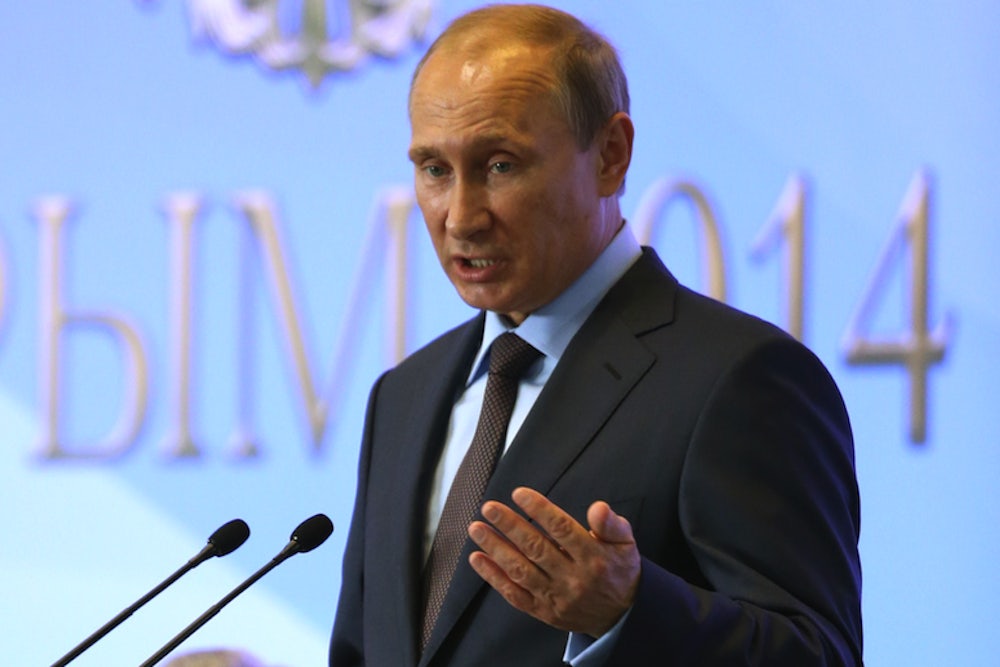The "frozen conflict" that Russia has been angling for in Eastern Ukraine effectively begins today. The Ukrainian parliament approved two bills put forward by President Petro Poroshenko on Tuesday morning, offering amnesty to rebels not guilty of serious crimes and granting three years of self-rule to rebel-held territory in Donetsk and Luhansk.
The bills are huge concessions to Russia and Russian-backed rebels. The decision to grant rebels self-rule, for example, makes official the results of the illegal referendum held in the east in May, when the separatists claimed to have secured nearly 90 percent of the people’s vote in favor of autonomy. British Foreign Secretary William Hague called the May referendum “illegal by anybody’s standards.” The Kremlin called for it to be immediately implemented. Four months later, look who got their way.
According to Poroshenko, the three-year stipulation is necessary to ensure adequate constitutional reform, after which he expects Donetsk and Luhansk to somehow return to the fold of the Ukrainian government. “During this time we will be able to introduce the issue of profound decentralization which must also provide for respective amendments to the Constitution,” Poroshenko said. “There is nothing more important for us than peace.” He also called for local elections in November to determine who will control the self-ruled areas.
Among the rebels, the provisions of the self-rule law have already garnered mixed reviews, and it’s uncertain how they will be implemented. Andriy Purgin, first deputy prime minister of the self-declared Donetsk People’s Republic, told RIA Novosti that the entirety of the Donetsk and Luhansk oblasts must be awarded self-rule, not just those areas currently under rebel control. Igor Plotnitsky, prime minister of the separatist Luhansk People’s Republic, said the new law signals “the first chance for a peaceful settlement.”
Meanwhile, shelling in Donetsk killed six people on Monday, and Ukranian media reported skirmishes between Russian-backed militias and unspecified “local groups of terrorists.” This is what the State Department means when it says the ceasefire is “mostly holding,” and it paints a pretty clear picture of what the next few years in eastern Ukraine may look like.
A frozen conflict, when the Kremlin is involved, is what happens when, as the BBC put it, “a bloody, territorial conflict with no obvious solution is put on hold, with Russia stepping in to keep the peace on its own terms.” On Tuesday, the self-declared Donetsk and Luhansk People’s Republics announced they are merging their militias into a single force, the United Army of Novorossiya, which will liberate Ukraine from “Nazi scum.” These are the people who will be ruling the populations of Donetsk and Luhansk for the next three years.
It’s hard to look at all this and not get the feeling that those who died fighting for Ukraine gave their lives for naught. On Tuesday, Poroshenko triumphantly held up on the floor of the parliament Ukraine’s EU Association Agreement—the same agreement whose rejection by former President Viktor Yanukovych spurred protesters to gather on the Maidan. But at a summit on Friday, the E.U. agreed that it won’t be fully implemented until 2016. According to Simon Shustry, the Ukrainian oligarch Viktor Pinchuk, who hosted the summit, pointed out that delaying the agreement is precisely what Russia hoped to get out of Ukraine before thousands of people died in the conflict.
But Poroshenko’s government cannot survive should it keep pushing forward with its “anti-terrorist operation” in the East, especially now that its Western partners have made it abundantly clear they are not willing to go to bat for Ukraine. Russia has cut off the gas supply, and the war has decimated the country’s coal industry. “The mines have been bombed, so there’s no production of thermal coal; without supplies to power plants, there are problems with electricity and heating. It’s obvious the situation in the winter is going to be very difficult,” Ukrainian Prime Minister Arseniy Yatsenyuk said.
Enter the rapid-fire concessions, which make the new Ukrainian government all too closely resemble the one it replaced. Remember the outrage over Russia’s humanitarian convoy? The second one is on its way. Battalions that fought on the side of the Ukrainian army are making their way back to Kiev, and they are not pleased with their leaders. "We will close the border and then go to Kiev to change the regime," one fighter told Alec Luhn. "People died on Maidan, and no one answered for it. Now people are dying [in Ilovaisk] and nobody is answering for this. And we want to change this."
As of this writing, protesters are burning tires outside the Ukrainian parliament, forcing their representatives to finally, finally pass a lustration bill that would remove corrupt politicians from power. The measure was one of the primary demands of the Maidan revolution, as were parliamentary elections, now scheduled for October 26. Almost a year after the revolution’s start, the forthcoming elections—in which some of the movement’s leaders are now running—offer some glimmer of hope, but for now there’s only more reason for skepticism.
